22 Tips for a Healthy Bathroom Experience You Can Start Today
Welcome to a refreshing perspective on a subject that’s often overlooked but crucial to our well-being—the journey to a better bathroom experience. This colon health guide with Jonathan Bailor is dedicated to enhancing the everyday ritual of bowel movements, transforming it from a mundane task into a barometer of health and vitality.
For many, navigating the nuances of digestive health can seem daunting, yet it’s a key aspect of overall wellness, especially as we embrace our golden years. Here, simple yet impactful tips await, each designed to foster a more comfortable, regular, and satisfying bathroom routine. These strategies are not complex medical solutions but rather practical, everyday adjustments that promise significant improvements in one’s digestive health.
In this article, you will discover a blend of diet and lifestyle changes, as well as mindfulness practices that collectively contribute to a smoother, more efficient digestive process. It’s about understanding the small changes that can make a big difference and ensuring that every trip to the bathroom is as comfortable and stress-free as possible.
The joy of this journey is in its accessibility and ease of integration into daily life. It’s an invitation to pay attention to your body, to listen to its signals, and to respond with care. This isn’t just about addressing a single aspect of health; it’s about nurturing a vital body function that contributes to overall happiness and comfort.
If you are looking to improve your daily routine and support your digestive health, this guide offers valuable insights. It’s more than just information; it’s a pathway to a more comfortable and confident you. Share this journey with friends and family because everyone deserves the knowledge to transform their bathroom experience into a more pleasant and healthy part of life.
Understanding Bowel Movement Frequency
Digestive and kidney diseases are common, and they affect bathroom habits. When it comes to bowel movements, there’s no one-size-fits-all frequency that marks good health. Typically, a range from three times a day to three times a week is considered normal. What’s more important is the consistency and ease of these movements.
Several factors influence how often you visit the bathroom:
- Diet: Diet plays a pivotal role; a meal plan rich in fiber from fruits, vegetables, and legumes can promote regular bowel movements. Hydration is equally crucial; adequate water intake keeps the digestive system running smoothly.
- Age: Age also impacts bowel regularity. As we age, metabolism can slow down, and the digestive system may become less efficient, potentially leading to less frequent bowel movements. However, maintaining an active lifestyle with regular exercise can help counteract this slowdown.
- Stress: Stress is an overlooked but significant factor. High-stress levels can disrupt digestive processes, leading to irregularities. Practices like mindfulness and stress management can help maintain regularity.
- Medications and supplements: Medications and dietary supplements, especially those that affect the nervous system or directly impact the digestive tract, can alter bowel frequency. Always consult with healthcare professionals about the side effects of any medication.
- Health conditions: Lastly, individual health conditions, such as hypothyroidism or irritable bowel syndrome, can influence bowel movement frequency. If there are sudden changes in your bowel habits, it’s advisable to seek medical advice to rule out any underlying conditions. Remember, understanding your body’s normal rhythm and being attentive to any significant changes is key to maintaining digestive health and overall well-being.
Understanding Stool Appearance: Shape and Consistency
The appearance of stools provides significant insights into digestive health. A healthy stool typically has a smooth, soft consistency, resembling a sausage or snake. It should be easy to pass, indicating a well-functioning digestive system.
On the other hand, hard, lumpy stools suggest constipation, often due to inadequate fiber or fluid intake. If this happens frequently, it indicates chronic constipation. Loose, watery stools can indicate diarrhea, potentially caused by an infection or intolerance to certain foods.
Small, hard pellets are classic constipation symptoms, while fluffy pieces with ragged edges point towards a mild form of diarrhea. Extremely soft stool that is more liquid than solid suggests a lack of fiber or an excess of fats, often leading to urgency or incontinence.
Monitoring these variations is important, as they can be indicators of your body’s digestive health and overall well-being.
Decoding the Colors of the Stool
Stool color can be a useful indicator of overall health and digestive function. While a range of colors is normal, certain hues can signal specific health issues.
- Brown: This is the most common stool color, indicative of a healthy digestive process. The brown color comes from bile, which is produced in the liver.
- Green: Stools can be green due to consuming lots of green, leafy vegetables or green food coloring. It can also occur when food moves through the gut too quickly, not giving the bile enough time to break down completely.
- Yellow: A yellow, greasy, and foul-smelling stool can point to excess fat, suggesting a malabsorption disorder like celiac disease.
- Black stool can be caused by certain medications or iron supplements. However, it could also indicate bleeding in the upper gastrointestinal tract, such as from a stomach ulcer.
- Red or Maroon: Bright red stools can result from eating beets or red food coloring. However, they can also indicate bleeding in the lower intestinal tract, such as from hemorrhoids or colitis.
- Light-colored, White, or Clay-colored: A lack of bile can lead to pale or clay-colored stool. This may suggest a bile duct obstruction or other issues related to the liver or gallbladder.
- Orange: This can occur due to certain foods or medications. However, orange stool might also indicate a problem with the liver or bile ducts, especially if it’s accompanied by a lighter coloration of urine. Foods rich in beta-carotene, such as carrots and sweet potatoes, can also lead to orange-colored stools.
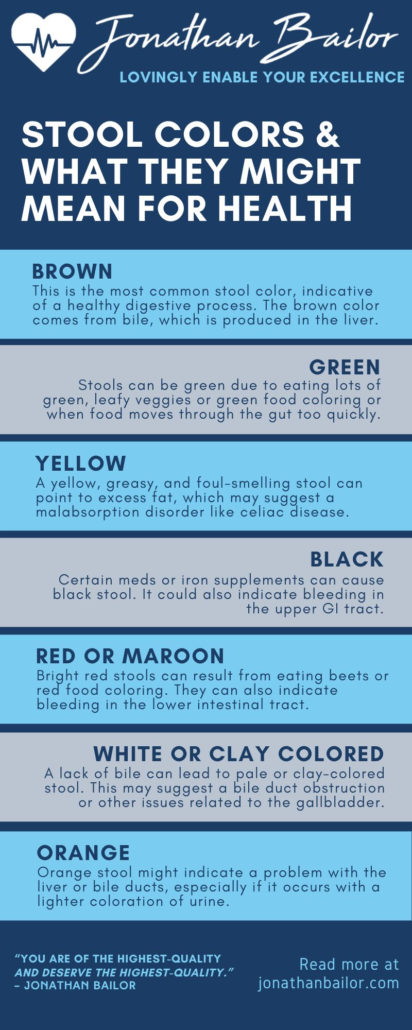
Feeling Better Is Priceless, That's Why We Don't Put A Price On It!
“It’s Like A Free and Medically Valid Version of Noom and Weight Watchers Online”
~ Dr. Doctor Matthew Oleshiak, MD
Click the 'LEARN MORE' button below for free lifetime access to the fast fix program developed by Jonathan and top Ivy League Medical Doctors
LEARN MOREP.S. It's not a free trial. It's not part of the program for free. The entire program is free, forever, for real! No credit card needed.
Tips for a Healthy Bathroom Experience
Enhancing Bathroom Health with Lifestyle Changes
Certain lifestyle changes can significantly improve bathroom health, making your daily routine more comfortable and regular. These changes focus on enhancing your overall well-being, which in turn reflects in your digestive health. They are simple to implement and can profoundly impact how your body functions.
- Establish a Regular Sleep Pattern: Prioritizing a consistent sleep schedule helps regulate the body’s natural rhythms, including digestion. Adequate sleep ensures that the digestive system functions smoothly, reducing issues like constipation or irregular bowel movements.
- Stay Hydrated Throughout the Day: Proper hydration is key to maintaining good bathroom health. Drinking enough water softens stool, making it easier to pass, and helps prevent constipation. Aim for at least 8 glasses of water daily and increase intake in hot weather or during physical activity.
- Create a Stress-Free Environment: High-stress levels can disrupt digestive processes, leading to constipation or diarrhea. Engaging in relaxation techniques such as deep breathing, meditation, or light yoga can help manage stress and maintain a healthy digestive system.
- Monitor Your Alcohol and Caffeine Intake: Excessive consumption of alcohol and caffeine can lead to dehydration, impacting bowel movements. Moderating these beverages and balancing them with plenty of water can promote healthier digestion.
- Adopt a Bathroom Routine: Setting a regular time each day for bathroom visits can train your body to have regular bowel movements. This habit can be particularly beneficial for those struggling with constipation or irregular patterns.
- Reduce Long Sitting Periods: Prolonged sitting can hinder the digestive process. If your lifestyle or work requires long periods of sitting, make sure to take regular breaks to move around, which can stimulate digestion and promote regular bowel movements.
Implementing these lifestyle adjustments can positively impact your bathroom health, leading to a more comfortable and regular routine.
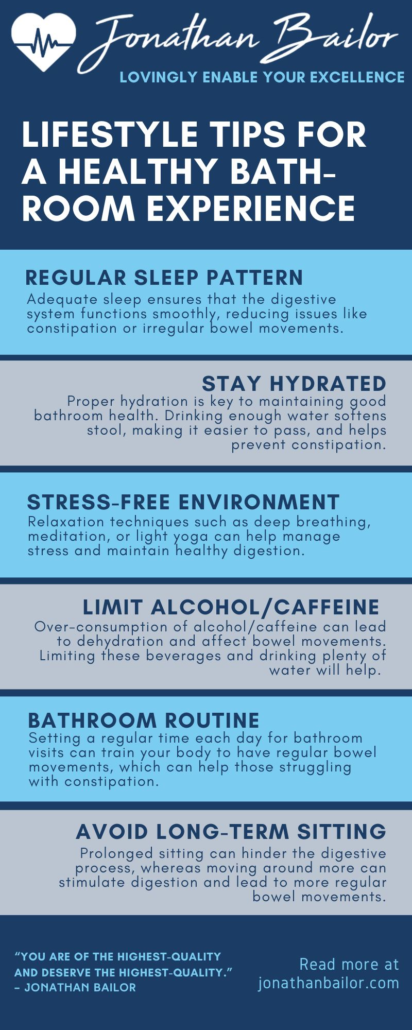
Dietary Adjustments for Improved Bathroom Health
Diet plays a crucial role in maintaining bathroom health. The right food choices can enhance digestive efficiency and regularity, creating a more pleasant bathroom experience. Here are some dietary changes that are simple to incorporate into your daily routine and can make a significant difference in your digestive health.
- Increase Fiber Intake: Eat foods high in fiber, like vegetables, fruits, and legumes, into your diet. High-fiber foods help form bulk in the stool, making it easier to pass and preventing constipation. Start slowly to allow your body to adjust and avoid bloating.
- Stay Hydrated with Food: Besides drinking water, consume foods with high water content, like cucumbers, tomatoes, and watermelon. These foods can help maintain hydration and aid in smoother bowel movements.
- Limit Processed Foods: Processed foods often lack fiber and essential nutrients while being high in fats and sugars, which can disrupt digestive health. Opt for whole, unprocessed foods for better digestion and regular bowel movements.
- Incorporate Probiotics: Eating foods rich in probiotics, such as yogurt, kefir, and fermented vegetables, can support gut health. Probiotics help balance the gut flora, which is essential for regular bowel movements and overall digestive health.
- Moderate Dairy Consumption: For some, dairy products can lead to constipation or diarrhea. If you notice a sensitivity, consider reducing dairy intake or switching to lactose-free options. Pay attention to how your body reacts to dairy products and adjust accordingly to maintain regularity.
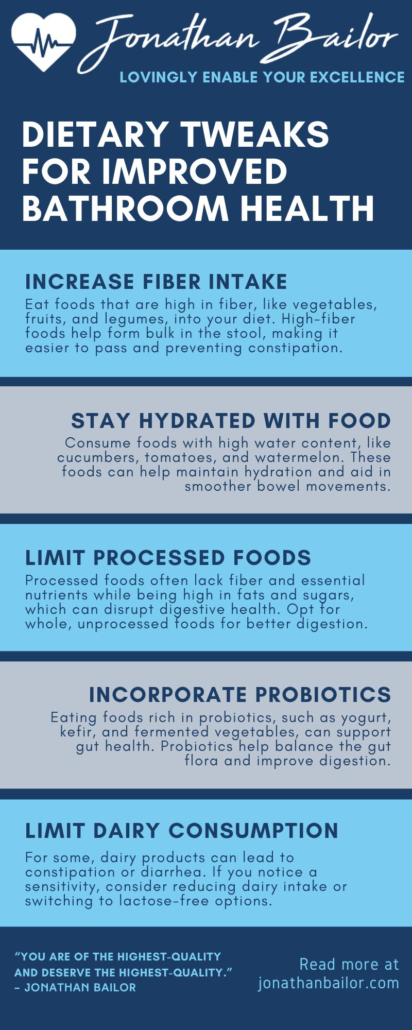
Energizing Movements for Optimal Bathroom Health
Physical activity is not just about staying fit; it’s a key player in promoting a healthy digestive system. Engaging in regular, gentle movements can significantly enhance bowel regularity and overall bathroom experience.
In this section, we explore a variety of physical activities that can encourage smoother digestion and contribute to a more satisfying bathroom routine. These simple yet effective practices can be easily incorporated into daily life, offering a natural and enjoyable way to support your digestive health.
- Daily Walking: A brisk daily walk can do wonders for your digestive system. Walking stimulates gut motility, helping to move food through your digestive tract more efficiently. Aim for a 30-minute walk daily to experience its benefits on regular bowel movements.
- Yoga for Digestion: Certain yoga poses, especially twists and forward bends, can massage your internal organs, enhancing digestion and encouraging bowel movements. Incorporate poses like ‘Pavanmuktasana’ (Wind-Relieving Pose) and ‘Ardha Matsyendrasana’ (Half Spinal Twist) into your routine.
- Cycling for Regularity: Cycling, whether on a stationary bike or outdoors, can improve digestion by stimulating intestinal muscles. Regular cycling can help maintain a consistent bowel movement pattern.
- Light Aerobics: Engaging in light aerobic exercises can increase blood flow to your digestive organs, aiding in efficient digestion and waste elimination. Simple routines like step aerobics or low-impact dance workouts can be both fun and beneficial for your gut health.
- Stretching and Flexibility: Stretching exercises, especially those involving the abdomen, can help ease bloating and encourage bowel movements. Regular stretching can improve your overall digestive function and aid in maintaining a healthy bathroom schedule.
- Pelvic Floor Exercises: Strengthening your pelvic floor muscles can improve bowel control and regularity. Simple exercises like Kegels can be done anywhere, anytime, and they play a crucial role in maintaining healthy bowel movements.
Incorporating these physical activities into your daily life can significantly improve your bathroom health. Each activity offers a unique benefit to your digestive system. Combined with other lifestyle and dietary changes, they can create a holistic approach to maintaining a healthy and regular bathroom routine.
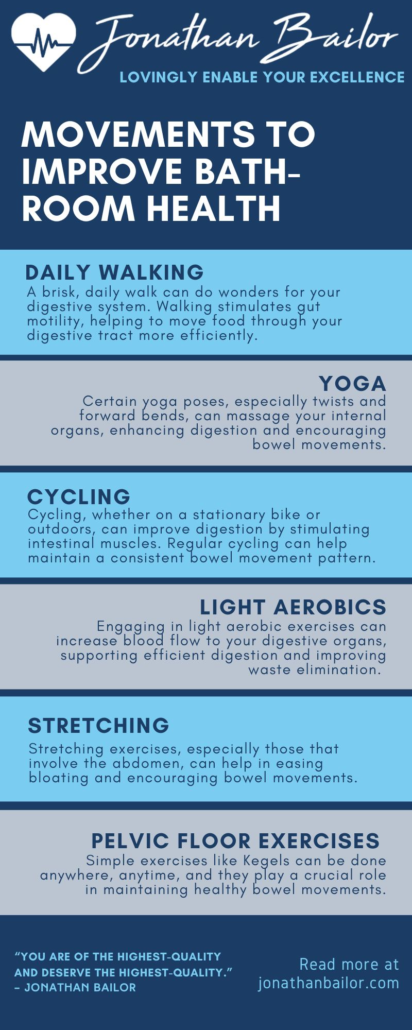
Mental and Spiritual Approaches for Enhanced Bathroom Health
The journey to a better bathroom experience isn’t just about what we eat or how much we exercise. It’s also deeply connected to our mental and spiritual well-being. Stress, anxiety, and emotional unrest can significantly affect our digestive health. In this section, we explore various mental and spiritual practices that can profoundly impact our bathroom health. These approaches are designed to create a balanced state of mind, supporting a healthier digestive process.
- Mindful Meditation: Regular meditation can reduce stress, a common contributor to digestive issues. Practicing mindfulness for a few minutes daily can help calm your mind and improve your body’s digestive function.
- Deep Breathing Techniques: Deep, controlled breathing can help relax the muscles in your abdomen, aiding in smoother digestion and bowel movements. Incorporate breathing exercises like diaphragmatic breathing into your daily routine to support your digestive health.
- Positive Affirmations: The power of positive thinking can extend to your digestive health. Affirmations like “My body processes food efficiently” can help create a positive mindset, positively impacting your digestion and bathroom habits.
- Gratitude Practice: Maintaining a gratitude journal or simply taking time each day to acknowledge the things you’re grateful for can lower stress levels and improve overall well-being, which can positively affect your digestive health.
- Spiritual Practices: Engaging in spiritual practices that resonate with you, whether it’s prayer, attending services, or other forms of spiritual expression, can bring peace and balance, positively influencing your overall health, including your bathroom habits.
Embracing these mental and spiritual practices can create a significant positive impact on your bathroom health. They offer natural, gentle ways to support your body’s digestive processes, ensuring a more comfortable and regular bathroom experience. Incorporating these practices into your daily life can help you achieve a holistic balance, enhancing both your physical and emotional well-being.
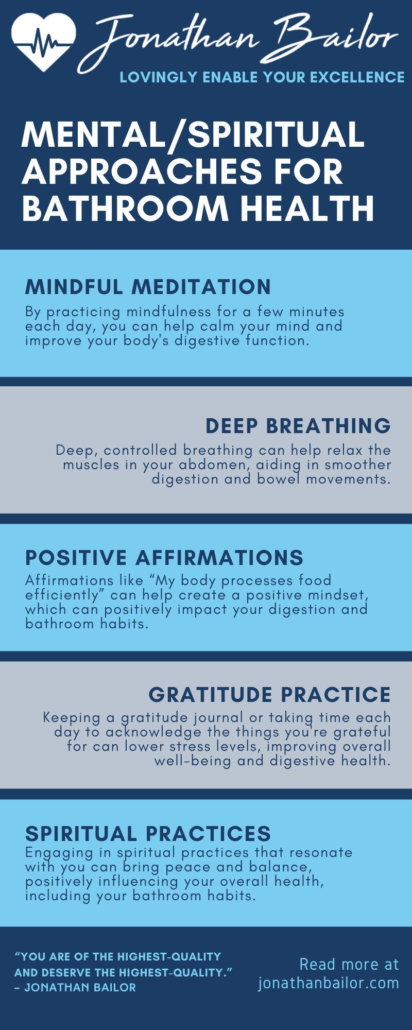
Navigating the Nuances of Bathroom Health: Your Questions Answered
What are the signs of a healthy bowel movement?
Healthy bowel movements typically are easy to pass, occur regularly (anywhere from three times a day to three times a week), and result in soft, formed stools. Consistency, frequency, and effortlessness in passing stools are key indicators. Color also plays a role; a healthy stool is usually a shade of brown, thanks to the bile produced in your liver.
How does diet affect bathroom health?
Diet plays a pivotal role in bathroom health. A balanced diet rich in fiber from fruits, vegetables, and legumes helps ensure regular bowel movements and prevents constipation. Hydration is equally important, as adequate water intake helps soften stool. Conversely, excessive consumption of processed foods and low fiber intake can lead to irregularity and discomfort.
Can stress impact bathroom habits?
Absolutely. Stress can significantly impact your digestive system, often leading to conditions like constipation or diarrhea. It can disrupt the natural rhythm of your digestive tract, making bathroom visits more irregular. Managing stress through relaxation techniques, exercise, and adequate sleep can help maintain regular bowel movements.
Is there an ideal frequency for bowel movements?
There isn’t a one-size-fits-all answer, as bowel movement frequency varies from person to person. Anywhere from three times a day to three times a week is considered normal as long as the stools are soft and pass comfortably. It’s more important to notice changes in your regular pattern, as these might indicate a need for dietary or lifestyle adjustments.
What role does physical activity play in bathroom health?
Regular physical activity helps keep the digestive system active and efficient, promoting regular bowel movements. It can improve gut motility, making it easier for your body to process and eliminate waste and help alleviate symptoms of constipation. Exercises like walking, yoga, and light stretching are particularly beneficial for stimulating digestion. Additionally, physical activity reduces stress, positively impacts your digestive health, and promotes regular bowel movements. Therefore, incorporating a consistent exercise routine can be a key factor in maintaining optimal bathroom health.
A Final Thought on Optimal Bathroom Health
Remember that your journey towards better bathroom health is a blend of mindful lifestyle choices, dietary wisdom, and physical harmony. It’s about more than just comfort; it’s about embracing practices that enhance your overall well-being. From the foods you choose to the way you move and relax, every small change can lead to significant improvements. Share this guide with your friends family, and on social media, inspiring them to embark on their own paths towards a healthier, more balanced life. Together, let’s transform our daily routines into steps toward lasting wellness.
Feeling Better Is Priceless, That's Why We Don't Put A Price On It!
“It’s Like A Free and Medically Valid Version of Noom and Weight Watchers Online”
~ Dr. Doctor Matthew Oleshiak, MD
Click the 'LEARN MORE' button below for free lifetime access to the fast fix program developed by Jonathan and top Ivy League Medical Doctors
LEARN MOREP.S. It's not a free trial. It's not part of the program for free. The entire program is free, forever, for real! No credit card needed.

